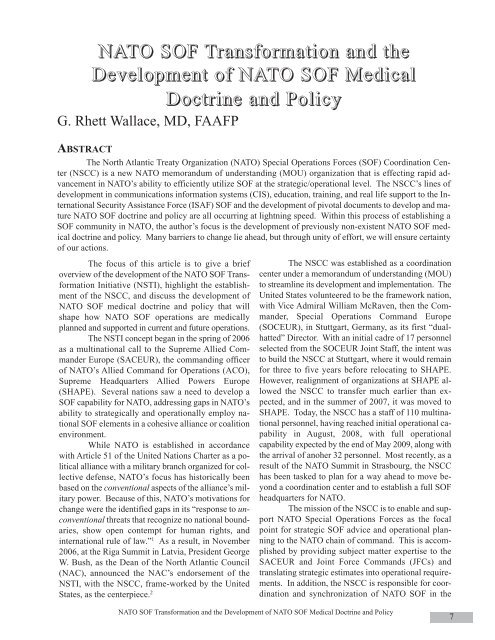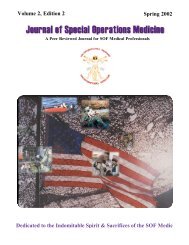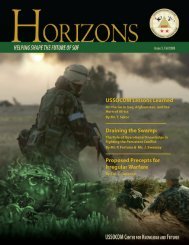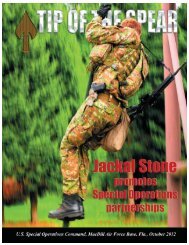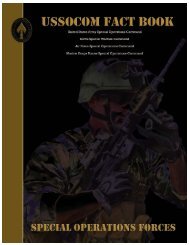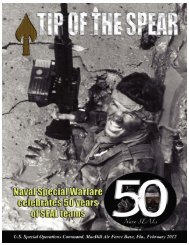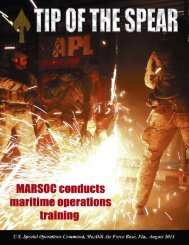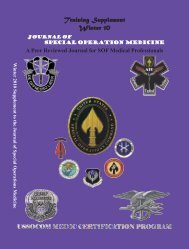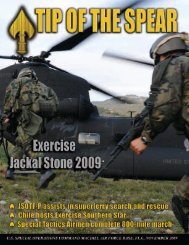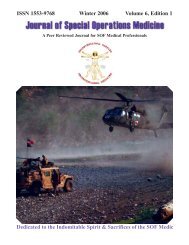Figure 80: Minimal inversion of taped ankle asdetermined by inability to invert ankle/foot andraise the1st MTP joint off of the floor.GENERAL PRINCIPLES AND GUIDELINESIn trying to anticipate return to activity, ideallythere is no swelling or effusion, the patient has fullrange of motion and approximately 90% of normalstrength. However, the treating ATP must be awarethat as swelling decreases, the pain decreases and themotion increases. This gives a very false sense of healing.In fact, the symptoms will often disappear approximatelyfour weeks prior to completion of healing.Obviously, this sets up the situation whereby the patientis relatively asymptomatic, the healing is immatureand not complete, and a premature return toactivity leads to an extremely high re-injury rate.In general, successful treatment of non-battlefieldrelated knee and ankle injuries, in the austere situation,so that the patient may remain functional, requires severalthings:• The ATP must understand the anatomy involved.• He must know the questions to ask to identifythe mechanism of injury.• The ATP must understand the taping principles.• He must recognize that the taping is designedto support the injured tissue and decrease thestress load on the injury. To determine thetype of taping and to apply it successfully, itis obviously necessary to have a high probability of a working diagnosis.• He must know the possible diagnoses affectinga joint given a set of physical findingsand a mechanism of injury• Most importantly, a minimum of six weeksof healing is required, regardless of what thepatient says or how the patient feels.• The absence of pain does not equal healing• All of the injuries discussed here are significantinjuries that absolutely require furthermedical evaluation upon return to base.REFERENCEPerrin, David. (2005). Taping and Bracing, HumanKinetics.This completes our three-part series.JF Rick Hammesfahr, M.D. graduated from Colgate University in 1973 and the College of Medicineand Dentistry of New Jersey in 1977. He was Chief Resident in Orthopaedics at Emory Universityfrom 1980-1982. In addition to receiving numerous surgical awards, he has been on the speaking facultyof numerous medical and orthopaedic meetings serving as the co-director of several courses onknee surgery. His publications have focused on tactical medicine, arthroscopy, calcaneal fractures, abductorparalysis, wound healing, running injuries, meniscal repair, septic knees, and sports medicine.He has written two book chapters, one book, published 22 articles, serves on the editoral review boardof multiple medical journals, is a chief editor of the “Ranger Medic Handbook,” and has presented over120 CME lectures and talks on orthopedics and sports injuries.Dr Hammesfahr has served as president of the largest regional orthopaedic association, the Southern OrthopaedicAssociation. Currently, he is the Director of the Center for Orthopaedics and Sports Medicine and serves as the Chairmanof the USSOCOM Curriculum and Examination Board.6Journal of <strong>Special</strong> <strong>Operations</strong> Medicine Volume 9, Edition 3 / <strong>Summer</strong> 09
NATO SOF Transformation and theDevelopment of NATO SOF MedicalDoctrine and PolicyG. Rhett Wallace, MD, FAAFPABSTRACTThe North Atlantic Treaty Organization (NATO) <strong>Special</strong> <strong>Operations</strong> Forces (SOF) Coordination Center(NSCC) is a new NATO memorandum of understanding (MOU) organization that is effecting rapid advancementin NATO’s ability to efficiently utilize SOF at the strategic/operational level. The NSCC’s lines ofdevelopment in communications information systems (CIS), education, training, and real life support to the InternationalSecurity Assistance Force (ISAF) SOF and the development of pivotal documents to develop and matureNATO SOF doctrine and policy are all occurring at lightning speed. Within this process of establishing aSOF community in NATO, the author’s focus is the development of previously non-existent NATO SOF medicaldoctrine and policy. Many barriers to change lie ahead, but through unity of effort, we will ensure certaintyof our actions.The focus of this article is to give a briefoverview of the development of the NATO SOF TransformationInitiative (NSTI), highlight the establishmentof the NSCC, and discuss the development ofNATO SOF medical doctrine and policy that willshape how NATO SOF operations are medicallyplanned and supported in current and future operations.The NSTI concept began in the spring of 2006as a multinational call to the Supreme Allied <strong>Command</strong>erEurope (SACEUR), the commanding officerof NATO’s Allied <strong>Command</strong> for <strong>Operations</strong> (ACO),Supreme Headquarters Allied Powers Europe(SHAPE). Several nations saw a need to develop aSOF capability for NATO, addressing gaps in NATO’sability to strategically and operationally employ nationalSOF elements in a cohesive alliance or coalitionenvironment.While NATO is established in accordancewith Article 51 of the <strong>United</strong> Nations Charter as a politicalalliance with a military branch organized for collectivedefense, NATO’s focus has historically beenbased on the conventional aspects of the alliance’s militarypower. Because of this, NATO’s motivations forchange were the identified gaps in its “response to unconventionalthreats that recognize no national boundaries,show open contempt for human rights, andinternational rule of law.” 1 As a result, in November2006, at the Riga Summit in Latvia, President GeorgeW. Bush, as the Dean of the North Atlantic Council(NAC), announced the NAC’s endorsement of theNSTI, with the NSCC, frame-worked by the <strong>United</strong><strong>States</strong>, as the centerpiece. 2The NSCC was established as a coordinationcenter under a memorandum of understanding (MOU)to streamline its development and implementation. The<strong>United</strong> <strong>States</strong> volunteered to be the framework nation,with Vice Admiral William McRaven, then the <strong>Command</strong>er,<strong>Special</strong> <strong>Operations</strong> <strong>Command</strong> Europe(SOCEUR), in Stuttgart, Germany, as its first “dualhatted”Director. With an initial cadre of 17 personnelselected from the SOCEUR Joint Staff, the intent wasto build the NSCC at Stuttgart, where it would remainfor three to five years before relocating to SHAPE.However, realignment of organizations at SHAPE allowedthe NSCC to transfer much earlier than expected,and in the summer of 2007, it was moved toSHAPE. Today, the NSCC has a staff of 110 multinationalpersonnel, having reached initial operational capabilityin August, 2008, with full operationalcapability expected by the end of May 2009, along withthe arrival of anoher 32 personnel. Most recently, as aresult of the NATO Summit in Strasbourg, the NSCChas been tasked to plan for a way ahead to move beyonda coordination center and to establish a full SOFheadquarters for NATO.The mission of the NSCC is to enable and supportNATO <strong>Special</strong> <strong>Operations</strong> Forces as the focalpoint for strategic SOF advice and operational planningto the NATO chain of command. This is accomplishedby providing subject matter expertise to theSACEUR and Joint Force <strong>Command</strong>s (JFCs) andtranslating strategic estimates into operational requirements.In addition, the NSCC is responsible for coordinationand synchronization of NATO SOF in theNATO SOF Transformation and the Development of NATO SOF Medical Doctrine and Policy7
- Page 1 and 2: Volume 9, Edition 3 / Summer 09 Jou
- Page 3 and 4: An 18D deworms a camel during a “
- Page 5 and 6: Field Evaluation and Management of
- Page 7 and 8: The circumferential anchoring strip
- Page 9: In doing so, all the skin is closed
- Page 13 and 14: current and future operations, thes
- Page 15 and 16: sion of a physician, and limited pr
- Page 17 and 18: REFERENCES1. James L. Jones, “A b
- Page 19 and 20: This article is the first of two me
- Page 21 and 22: Figure 4 : A Special Forces medic c
- Page 23 and 24: exposure. Conversely, the customary
- Page 25 and 26: 7. Ted Westmoreland. (2006). Attrib
- Page 27 and 28: first three days of injury, althoug
- Page 29 and 30: 9. Markgraf CG, Clifton GL, Moody M
- Page 31 and 32: the only sign of OCS may be elevate
- Page 33 and 34: E. The canthotomy allows for additi
- Page 35 and 36: 33. Rosdeutscher, J.D. and Stradelm
- Page 37 and 38: Tinnitus, a Military Epidemic:Is Hy
- Page 39 and 40: The development of chronic NIHL pro
- Page 41 and 42: supplied by diffusion. During expos
- Page 43 and 44: similar to those of other authors,
- Page 45 and 46: promising effect on tinnitus. Howev
- Page 47 and 48: ADDITIONAL REFERENCESHoffmann, G; B
- Page 49 and 50: et al. demonstrated that both right
- Page 51 and 52: TYPICAL CHEST RADIOGRAPH FINDINGS I
- Page 53 and 54: 11. Norsk P, Bonde-Petersen F, Warb
- Page 55 and 56: ABSTRACTS FROM CURRENT LITERATUREMa
- Page 57 and 58: tourniquet times are less than 6 ho
- Page 59 and 60: tal from July 1999 to June 2002. In
- Page 61 and 62:
Operation Sadbhavana: Winning Heart
- Page 63 and 64:
CENTRAL RETINAL VEIN OCCLUSION IN A
- Page 65 and 66:
of the X chromosome. Notable is tha
- Page 67 and 68:
AUTHORS*75th Ranger Regiment6420 Da
- Page 69 and 70:
Casualties presenting in overt shoc
- Page 71 and 72:
PSYCHOLOGICAL RESILIENCE AND POSTDE
- Page 73 and 74:
spondents without PTSD (M = 4.6, SD
- Page 75 and 76:
patients, whereas the mean score of
- Page 77 and 78:
29. Whealin JM, Ruzek JI, Southwick
- Page 79 and 80:
average, time between return from d
- Page 81 and 82:
ing functioning in both PTSD (Zatzi
- Page 83 and 84:
Editorial Comment on “Psychologic
- Page 85 and 86:
Blackburn’s HeadhuntersPhilip Har
- Page 87 and 88:
The Battle of Mogadishu:Firsthand A
- Page 89 and 90:
Task Force Ranger encountered enemy
- Page 91 and 92:
Peter J. Benson, MDCOL, USACommand
- Page 93 and 94:
Numerous military and civilian gove
- Page 95 and 96:
Anthony M. Griffay, MDCAPT, USNComm
- Page 97 and 98:
This is a great read that speaks di
- Page 99 and 100:
and twenty-eight. Rabies immune glo
- Page 101 and 102:
Rhett Wallace MD FAAFPLTC MC SFS DM
- Page 103 and 104:
LTC Craig A. Myatt, Ph.D., HQ USSOC
- Page 105 and 106:
LTC Bill Bosworth, DVM, USSOCOM Vet
- Page 107 and 108:
Europe, Mideast, Africa and SWAU.S.
- Page 109 and 110:
SOF and SOF Medicine Book ListWe ha
- Page 111 and 112:
TITLE AUTHOR ISBNCohesion, the Key
- Page 113 and 114:
TITLE AUTHOR ISBNI Acted from Princ
- Page 115 and 116:
TITLE AUTHOR ISBNRats, Lice, & Hist
- Page 117 and 118:
TITLE AUTHOR ISBNThe Healer’s Roa
- Page 119 and 120:
TITLE AUTHOR ISBNGuerilla warfare N
- Page 121 and 122:
TITLEAUTHORBlack Eagles(Fiction)Bla
- Page 123 and 124:
TITLE(Good section on Merrill’s M
- Page 125 and 126:
GENERAL REFERENCESALERTS & THREATSB
- Page 127 and 128:
Aviation Medicine Resources: http:/
- Page 129 and 130:
LABORATORYClinical Lab Science Reso
- Page 131 and 132:
A 11 year old boy whose tibia conti
- Page 133 and 134:
Meet Your JSOM StaffEXECUTIVE EDITO
- Page 135 and 136:
Special Forces Aidman's PledgeAs a


